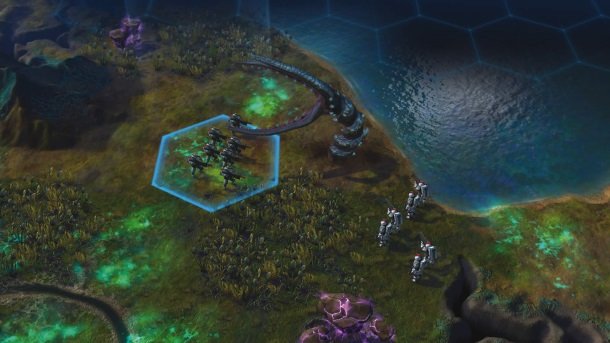Civilization: Beyond Earth designers talk about the science behind the game

In an op-ed written for Space.com, Civilization: Beyond Earth Lead Designers Will Miller and David McDonough talk about the game's scientific underpinnings, how the tech tree will differ from previous Civilization games and why "the inflection point" means that humanity's first interstellar colonists will be completely on their own.
In prior Civilization games, players build their civilizations from virtually nothing, progressing from the most basic sorts of technology to futuristic wonders. Civilization: Beyond Earth is different, because it begins with space travel and branches out from there. But that doesn't mean that humanity has come together in peace and harmony as it boldly ventures out among the stars.
"In Beyond Earth, we start with the premise that humanity has emerged from a period of great difficulty with a renewed interest and drive in exploring space. In our game fiction, this is galvanized by a few key events, such as the first image of a habitable world, another pale blue dot around a distant star," Miller and McDonough wrote . "But it is also driven by need. Settling an extrasolar planet would be a massively resource-intensive process, and as resources become scarce, eventually, there won't be enough to support mass colonization, which is an idea we're referring to as the Inflection Point."
As a one-off journey, help won't be forthcoming from the homeworld, which is obviously a central element of gameplay; after all, it's not much fun if you can just phone home for more stuff. The need to be self-reliant, as well as the open-ended possibilities of the future, means that while early-game technologies will "draw inspiration" from real-world research currently underway, the Beyond Earth tech tree is actually a web, "showing that humanity might pursue any number of technological directions in the future, and leaving those discrete choices in the player's hands."
"Buried through the game are bits of what we've learned about thorium reactors or transgenic medicine or climate engineering," they wrote. "As designers, our main goal is for people to enjoy playing Beyond Earth, but if our players run across something in the game, and they're curious enough to look into it a bit more, then we'll be ecstatic to have done our part to raise a little more love for space and science."
Civilization: Beyond Earth comes out on October 24.
The biggest gaming news, reviews and hardware deals
Keep up to date with the most important stories and the best deals, as picked by the PC Gamer team.

Andy has been gaming on PCs from the very beginning, starting as a youngster with text adventures and primitive action games on a cassette-based TRS80. From there he graduated to the glory days of Sierra Online adventures and Microprose sims, ran a local BBS, learned how to build PCs, and developed a longstanding love of RPGs, immersive sims, and shooters. He began writing videogame news in 2007 for The Escapist and somehow managed to avoid getting fired until 2014, when he joined the storied ranks of PC Gamer. He covers all aspects of the industry, from new game announcements and patch notes to legal disputes, Twitch beefs, esports, and Henry Cavill. Lots of Henry Cavill.

